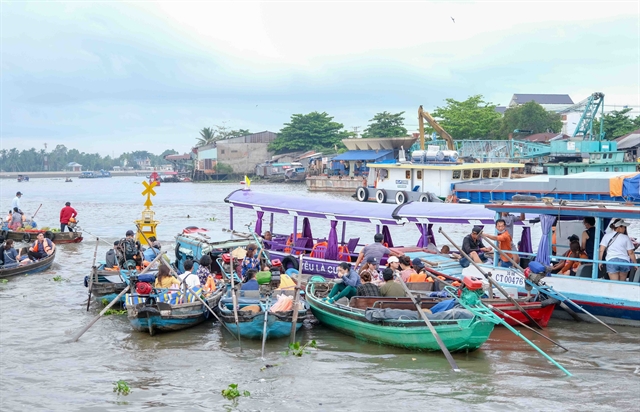 Society
Society

 |
| Cái Răng Floating Market in Cần Thơ City’s Cái Răng District. The market is one of the city’s most-visited destinations and has operated for more than 100 years.– VNA/VNS Photo Thanh Liêm |
CẦN THƠ – The Cửu Long (Mekong) Delta city of Cần Thơ is boosting the development of agricultural and rural tourism to increase added value for agricultural products and improve the lives of rural people.
The city boasts natural advantages for developing agricultural and rural tourism, especially river-related tourism, as it is surrounded by rivers and canals and rural areas account for more than 60 per cent of its total area.
It has 158 rivers and canals, including the Hậu River, a tributary of the Mekong river. The Hậu River runs a total length of 65km through the city.
The city has many localities that offer tourism services in fruit orchards such as Mỹ Khánh tourism village in Phong Điền District, Sơn riverine island in Bình Thuỷ District and Tân Lộc riverine island in Thốt Nốt District.
Lý Văn Bon of Sơn riverine island has successfully implemented a model of breeding fish in floating cages in the Hậu River in combination with offering tourism services.
He breeds various types of fish and decorates his floating cages with flower pots, coconut-leaf roofs and small boats made from plastic bottles to serve tourists taking photos.
With these, he receives about 7,000 tourists a year and provides jobs for 40 local workers.
Previously, many farmers on the island worried that tourists could make fish and fruit trees die, but they no longer think that now, he said.
After visiting, tourists buy fruit and fish, and farmers have additional income from selling these products directly to tourists and offering tourism services, he said.
Đào Thị Thanh Thuỷ, deputy director of the city Department of Culture, Sports and Tourism, said many farmers in Phong Điền, Cái Răng, Bình Thuỷ and Thốt Nốt districts have offered tourism services in their fruit orchards.
The development of agricultural and rural tourism has improved incomes for farmers and the infrastructure in rural areas, she said.
In the first quarter of this year, the city received more than 1.5 million tourists, up 76 per cent from the same period last year, and most of the tourists chose to visit ecotourism and agricultural tourism sites and floating markets, she said.
Agricultural tourism services have helped promote the city’s specialised products and products recognised under the country’s “One Commune-One Product” (OCOP) programmes to more consumers.
Trần Thái Nghiêm, deputy director of the city Department of Agriculture and Rural Development, said the city has 92 OCOP products and is promoting their sales at tourism destinations.
Thuận Hoà Food in Ninh Kiều District produces a tea made from roasted red bean, green bean, black bean, soy bean and brown rice, and it has been recognised as an OCOP product.
Lý Tiền Nghĩa, a representative of Thuận Hoà Food, said the tea is showcased and sold at the Sơn Riverine Island Agricultural Tourism Co-operative in Bình Thuỷ District.
Tourists visiting Sơn riverine island are introduced to the methods and materials used for making the tea and then can taste it, he said.
Tourism destinations are effective channels for promoting sales of products, he said.
He will take tea to the Mỹ Khánh tourism village in Phong Điền District to introduce it to more tourists, he said.
Targets
Cần Thơ is targeting half of its agricultural and rural tourism services will meet the standards of serving tourists by 2025.
It also aims for 70 per cent of people working in agricultural and rural tourism fields be provided professional skills to serve tourists by 2025.
To meet the targets, the city will focus on developing tourism products that have high quality, are diversified, and meet the requirements of tourists.
It will assist the owners of tourism accommodations to improve their facilities to increase tourism quality and protect the environment.
It will preserve and develop food making villages and agricultural production, and assist craftmen to develop their production.
It will focus on training tour guides who have deep knowledge about the city’s culture and agriculture and can speak foreign languages.
It will provide training courses on professional skills for orchard owners to improve their capacity of managing and developing fruit orchards that offer tourism services.
It is expected to receive 1.3 million tourists visiting agricultural and rural tourism sites in 2025. – VNS




